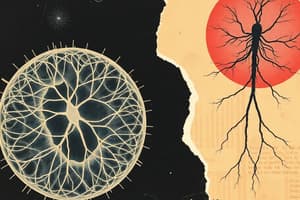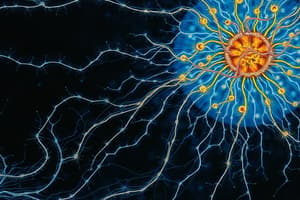Podcast
Questions and Answers
What is the function of microfilaments in a muscle cell?
What is the function of microfilaments in a muscle cell?
- To form a cellular scaffolding
- To generate lots of force (correct)
- To crawl and explore the environment
- To sense important stimuli
Which protein monomer forms microtubules?
Which protein monomer forms microtubules?
- Dynein
- Actin
- Myosin
- Tubulin (correct)
What is the primary cilium's function?
What is the primary cilium's function?
- To form a cellular scaffolding
- To crawl and explore the environment
- To generate force
- To sense important stimuli (correct)
Which protein can 'walk' and advance along microfilaments?
Which protein can 'walk' and advance along microfilaments?
What is the function of intermediate filaments?
What is the function of intermediate filaments?
Which intermediate filament is found in muscle cells and some epithelial cells?
Which intermediate filament is found in muscle cells and some epithelial cells?
Where are keratins primarily found?
Where are keratins primarily found?
Which intermediate filament confers stability and structure to glial cells?
Which intermediate filament confers stability and structure to glial cells?
What is the function of neurofilaments?
What is the function of neurofilaments?
What is responsible for the shape of microvilli?
What is responsible for the shape of microvilli?
Which of the following is NOT a function of membrane proteins?
Which of the following is NOT a function of membrane proteins?
What is the purpose of tight junctions in cells?
What is the purpose of tight junctions in cells?
Which of the following is NOT a component of an anchoring junction?
Which of the following is NOT a component of an anchoring junction?
What is the function of microfilaments in the cytoskeleton?
What is the function of microfilaments in the cytoskeleton?
What factors contribute to the stability of F-actin in microfilaments?
What factors contribute to the stability of F-actin in microfilaments?
Which type of lipid has a sphingosine backbone instead of a glycerol backbone?
Which type of lipid has a sphingosine backbone instead of a glycerol backbone?
Which type of lipid is a type of steroid and can intercalate between phospholipids?
Which type of lipid is a type of steroid and can intercalate between phospholipids?
Which type of lipid impacts membrane fluidity depending on its amount?
Which type of lipid impacts membrane fluidity depending on its amount?
Which type of lipid has sugar residues and can contribute to the glycocalyx?
Which type of lipid has sugar residues and can contribute to the glycocalyx?
Which type of lipid has a phosphate 'head' linked to another molecule?
Which type of lipid has a phosphate 'head' linked to another molecule?
Which type of transport requires the hydrolysis of ATP?
Which type of transport requires the hydrolysis of ATP?
What is the main function of aquaporins in the plasma membrane?
What is the main function of aquaporins in the plasma membrane?
What is the role of the Na+/K+ ATPase in preventing cell swelling?
What is the role of the Na+/K+ ATPase in preventing cell swelling?
What is the diffusional force that drives sodium into the cell?
What is the diffusional force that drives sodium into the cell?
What is the main function of the membrane surrounding organelles in the cell?
What is the main function of the membrane surrounding organelles in the cell?
Which of the following is true about the formation of micelles and bilayers in the cell membrane?
Which of the following is true about the formation of micelles and bilayers in the cell membrane?
What is the main function of the phospholipid bilayer in the cell membrane?
What is the main function of the phospholipid bilayer in the cell membrane?
Which of the following is true about the integrity of the plasma membrane?
Which of the following is true about the integrity of the plasma membrane?
Which membrane-bound components might have more cholesterol and/or sphingolipids?
Which membrane-bound components might have more cholesterol and/or sphingolipids?
Flashcards
Microfilament Function in Muscle
Microfilament Function in Muscle
Microfilaments provide structural support and facilitate muscle contraction by interacting with myosin.
Microtubule Monomer
Microtubule Monomer
Tubulin is the protein monomer that builds microtubules.
Primary Cilium Role
Primary Cilium Role
The primary cilium is a sensory organelle that plays a key role in cellular signaling.
Myosin Movement
Myosin Movement
Signup and view all the flashcards
Intermediate Filament Function
Intermediate Filament Function
Signup and view all the flashcards
Desmin Location
Desmin Location
Signup and view all the flashcards
Keratin Location
Keratin Location
Signup and view all the flashcards
GFAP Function
GFAP Function
Signup and view all the flashcards
Neurofilament Role
Neurofilament Role
Signup and view all the flashcards
Microvilli's Structure
Microvilli's Structure
Signup and view all the flashcards
Membrane Protein Function
Membrane Protein Function
Signup and view all the flashcards
Tight Junction Purpose
Tight Junction Purpose
Signup and view all the flashcards
Anchoring Junction Components
Anchoring Junction Components
Signup and view all the flashcards
Microfilaments in Cytoskeleton
Microfilaments in Cytoskeleton
Signup and view all the flashcards
F-actin Stability
F-actin Stability
Signup and view all the flashcards
Sphingolipid Backborn
Sphingolipid Backborn
Signup and view all the flashcards
Cholesterol Type
Cholesterol Type
Signup and view all the flashcards
Lipid's Effect on Membrane Fluidity
Lipid's Effect on Membrane Fluidity
Signup and view all the flashcards
Glycocalyx Contribution
Glycocalyx Contribution
Signup and view all the flashcards
Phospholipid Structure
Phospholipid Structure
Signup and view all the flashcards
Active Transport
Active Transport
Signup and view all the flashcards
Aquaporin Function
Aquaporin Function
Signup and view all the flashcards
Na+/K+ ATPase Role
Na+/K+ ATPase Role
Signup and view all the flashcards
Sodium Diffusion Force
Sodium Diffusion Force
Signup and view all the flashcards
Organelle Membrane Function
Organelle Membrane Function
Signup and view all the flashcards
Micelle and Bilayer Formation
Micelle and Bilayer Formation
Signup and view all the flashcards
Phospholipid Bilayer Function
Phospholipid Bilayer Function
Signup and view all the flashcards
Plasma Membrane Integrity
Plasma Membrane Integrity
Signup and view all the flashcards
Lipid Rafts
Lipid Rafts
Signup and view all the flashcards
Study Notes
Muscle Cell Microfilaments
- Microfilaments provide structural support and facilitate muscle contraction through interaction with myosin.
Microtubule Formation
- Tubulin is the protein monomer that forms microtubules.
Primary Cilium Function
- The primary cilium acts as a sensory organelle, playing a key role in signal transduction for the cell.
Protein Movement Along Microfilaments
- Myosin can 'walk' and advance along microfilaments, crucial for muscle contraction and other cellular movements.
Intermediate Filaments Functions
- Intermediate filaments provide mechanical strength and help maintain the integrity of cell structure.
Muscle Cell Intermediate Filament
- Desmin is the intermediate filament found in muscle cells and some epithelial cells, important for maintaining muscle integrity.
Keratin Location
- Keratins are primarily found in epithelial tissues, providing resilience and protection.
Intermediate Filament in Glial Cells
- GFAP (Glial Fibrillary Acidic Protein) confers stability and structure to glial cells in the nervous system.
Neurofilament Function
- Neurofilaments provide structural support specifically to neurons, playing a critical role in maintaining axonal diameter.
Microvilli Structure
- Actin filaments are responsible for the shape and structure of microvilli, increasing the surface area for absorption.
Membrane Protein Functions
- Functions of membrane proteins include transport, signaling, and structural support; however, not all proteins directly contribute to intercellular communication.
Tight Junctions Purpose
- Tight junctions prevent the passage of materials between cells, maintaining a selective barrier and controlling the paracellular pathway.
Anchoring Junction Components
- Components of anchoring junctions typically include cadherins and cytoskeletal connections; not all elements categorized under this junction contribute directly to mechanical support.
Microfilaments in Cytoskeleton
- Microfilaments in the cytoskeleton help maintain cell shape, facilitate movement, and enable cell division.
F-actin Stability Factors
- The stability of F-actin in microfilaments is influenced by nucleotide binding, regulatory proteins, and cross-linking with other proteins.
Sphingosine Backed Lipids
- Sphingolipids have a sphingosine backbone instead of a glycerol backbone, playing significant roles in membrane stability and signaling.
Steroid Lipid Type
- Cholesterol is a type of steroid lipid that can intercalate between phospholipids, influencing membrane fluidity.
Lipid Impact on Membrane Fluidity
- Phospholipids, particularly when saturated or unsaturated, impact the fluidity of membranes depending on their concentration.
Glycocalyx Contribution
- Glycolipids have sugar residues and contribute to the glycocalyx, which plays a role in cell recognition and protection.
Phospholipid Structure
- Phospholipids consist of a phosphate 'head' linked to fatty acid tails, forming a fundamental component of cell membranes.
ATP Hydrolysis Transport
- Active transport requires the hydrolysis of ATP to move substances against their concentration gradient.
Aquaporin Function
- Aquaporins facilitate the rapid transport of water across the plasma membrane, crucial for maintaining osmotic balance in cells.
Na+/K+ ATPase Role
- The Na+/K+ ATPase prevents cell swelling by actively transporting sodium out of the cell and potassium into the cell, maintaining osmotic balance.
Sodium Diffusional Force
- The electrochemical gradient acts as the diffusional force that drives sodium into the cell.
Organelle Membrane Function
- The membrane surrounding organelles helps compartmentalize cellular processes, providing distinct environments for biochemical reactions.
Micelle and Bilayer Formation
- Micelles and bilayers form due to the amphipathic nature of lipids, where hydrophobic tails cluster together away from water while hydrophilic heads face outward.
Phospholipid Bilayer Function
- The main function of the phospholipid bilayer is to create a barrier that separates the interior of the cell from the external environment, enabling selective permeability.
Plasma Membrane Integrity
- The integrity of the plasma membrane is maintained through lipid bilayer structure and membrane-bound proteins working cooperatively to resist hydrophilic and hydrophobic forces.
Cholesterol and Sphingolipid Presence
- Membrane-bound components such as lipid rafts might have higher concentrations of cholesterol and/or sphingolipids, impacting fluidity and signaling.
Studying That Suits You
Use AI to generate personalized quizzes and flashcards to suit your learning preferences.




